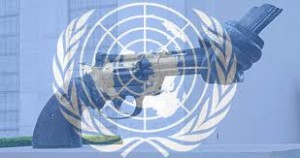Senior Editor
Following a stunning last-minute derailment of the United Nations’ highly-touted international Arms Trade Treaty (ATT) negotiations, global gun control proponents are expected to bring the issue back again in the fall.
That was the forecast from Julianne Versnel with the Second Amendment Foundation and International Association for the Protection of Civilian Arms Rights (IAPCAR). She was at the UN when the ATT meltdown occurred, as was Alan Gottlieb, chairman of the Citizens Committee for the Right to Keep and Bear Arms. Both were instrumental in creating IAPCAR, which now has member organizations all over the globe.
The treaty talks essentially imploded in the final 24 hours when ATT proponents did not produce a final draft of their proposed treaty until late in the afternoon of the day prior to a scheduled vote. Another problem was that the document was printed only in English, leaving many delegates from non-English speaking nations in the lurch because they had no document to study.
The US delegation and other delegations simply did not have enough time to study the proposal, and there were problems with it even if they had.
The final draft came barely 48 hours after an initial document was circulated that met with tepid reactions from several delegations including North Korea and Iran. In a press release, Gottlieb called the proposed treaty, “a blatant attempt to negate the recent Second Amendment court victories we’ve had in the United States, and to get around Second Amendment protections.”
A coalition of global gun control organizations has been pushing for the most extreme language and tenets in the proposed treaty, and now they are apparently back at the drawing board trying to come up with language that will be acceptable. That group includes International Action Network on Small Arms (IANSA), Oxfam International and Control Arms. The latter group was apparently responsible for a handout depicting their vision of the treaty provisions highlighted in Olympics-style rings, timed with the opening of the summer games in London.
Two of those items were “Arms and Bullets” and “Global Standards Over National Views.” The former alluded to privately owned firearms, and the latter was a veiled but direct threat to the Second Amendment, Gottlieb said.
Various gun rights organizations, including CCRKBA and the National Rifle Association, had been lobbying against this treaty for weeks. If the Obama administration signs it, the document must still be ratified by the US Senate, and after intense lobbying by the National Rifle Association, that doesn’t seem likely.
Now, with the national elections looming, President Barack Obama may be painting himself into an ever-tightening corner with American gun owners, if the treaty comes up again in October as anticipated.




